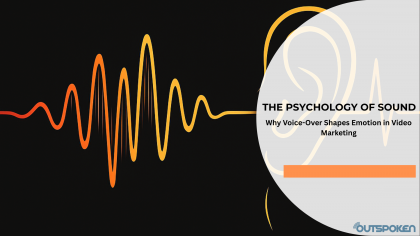Discover how voice-over psychology influences consumer behaviour in video marketing. Learn the neuro...
Voiceovers in the Age of AI: Navigating Change, Embracing Opportunities

"The notion that artificial intelligence could one day take our jobs is a message many of us will have heard in recent years." This statement from a recent BBC article ('A tech firm stole our voices - then cloned and sold them' - BBC News) highlights a growing concern among professionals across various industries, including the world of voiceovers. As AI voice technology rapidly advances, it's natural for voice actors to wonder about the future of their craft.
While the prospect of AI-generated voices might seem daunting, it also presents exciting opportunities for growth and innovation. In this blog post, we'll delve into the evolving landscape of voiceovers in the AI era, exploring the challenges and opportunities that lie ahead and how voice actors can adapt and thrive in this new environment.
AI Voice Technology: The Rise of Synthetic Voices
Artificial intelligence is revolutionising how we interact with technology, and voice is no exception. AI voice technology encompasses a range of techniques, from text-to-speech (TTS) systems that convert written text into spoken words, to advanced voice cloning that can replicate the unique nuances of a specific person's voice.
As the BBC article notes, AI voice cloning software can now create a "faithful clone" with just a few minutes of recorded speech. This technology is already being used in various applications, from virtual assistants and audiobooks to customer service chatbots and even personalised advertising.
The Impact on the Voice Over Industry: Challenges and Opportunities
The rise of AI voice technology has undoubtedly disrupted the voice over industry, presenting both challenges and opportunities for voice actors. On one hand, there's a legitimate concern about job displacement. As AI voices become more sophisticated and affordable, some clients might opt for synthetic voices over human talent, particularly for projects with tight budgets or high volume requirements. This could lead to lower demand for traditional voice over work.
However, AI also opens new possibilities for voice actors. It can enable them to reach wider audiences, create more accessible content, and even collaborate with AI to produce innovative and personalised audio experiences. As the BBC article notes, "Some experts predict AI will eventually have an impact on 40% of all jobs." In the voiceover industry, this impact could be both disruptive and transformative.
The Human Touch: Why Real Voices Still Matter
While AI voices are becoming increasingly sophisticated, they still lack the depth, nuance, and emotional range of a human voice actor. A well-trained voice actor can infuse a script with genuine emotion, adapt their delivery on the fly, and connect with the audience on a deeper level.
As voice actor Paul Skye Lehrman, who experienced the unsettling reality of having his voice cloned without his consent, puts it, "This whole experience has felt so surreal. When we thought about artificial intelligence, we were thinking of AI folding our laundry and making us dinner, not pursuing human beings' creative endeavours." His experience highlights the importance of preserving the artistry and human connection inherent in professional voice acting.
Adapting to the Future: How Voice Actors Can Thrive
The key to thriving in the AI era is adaptability. Voice actors who embrace new technologies, continuously hone their skills, and focus on their unique strengths will be well-positioned for success.
Here are some strategies for voice actors to stay ahead of the curve:
- Upskilling: Expand your vocal range, explore different accents and dialects, and develop your acting skills to offer a wider range of services.
- Niche specialisation: Identify your strengths and focus on developing expertise in specific genres or industries.
- Embrace technology: Explore how AI tools can enhance your workflow and expand your creative possibilities. For example, use AI-powered tools to transcribe and edit scripts, or to generate sound effects and background music.
- Market your unique value: Emphasise the qualities that set you apart from AI voices, such as your ability to convey genuine emotion, improvise, and connect with the audience.
The Ethical Landscape: Navigating the Complexities of AI Voice Cloning
The rise of AI voice cloning raises important ethical questions surrounding consent, ownership, and the potential for misuse. The BBC article highlights the case of Lehrman and Sage, who allege their voices were cloned and sold without their permission, prompting them to file a lawsuit.
This case underscores the need for clear guidelines and regulations to protect the rights of voice actors and ensure ethical AI development and usage. As AI voice technology continues to advance, it's crucial to have open discussions about the implications for the voice over industry and society as a whole.
How OutSpoken Protects Artists' Work From AI Theft
At OutSpoken Voices, we're acutely aware of the potential threats to voice actors' livelihoods and the ethical concerns surrounding the unauthorised use of their voices. We're committed to protecting our voice over artists and their work. We do not engage in or support any projects that involve the creation or use of AI-generated voice models, no matter the intended application.
Here are the two main ways we protect our artists from AI theft:
- Anonymity on OutSpoken Profiles: To protect your privacy, we ask all our artists not to include their full names on their OutSpoken profiles. When your application is accepted and we activate your account, we provide detailed guidelines on optimising your profile for the best visibility. One of our key instructions is to avoid including your full name on your profile or labelling your voice demos with it. By following these guidelines, your client-facing profile will remain anonymous, making it difficult for others to identify you or search for your voice samples elsewhere online.
- Protection of Your Voice Rights: When we invoice clients for recordings, we include a legal clause stating that "All rights are granted only for the agreed script and period. The audio may NOT be edited to create content for any script other than the agreed one, NOR used to develop synthetic voices, AI, text-to-speech, or any artificial voice models now or in the future, on any platforms or devices, known or unknown."
While we take various measures to protect our artists, it's important to recognise the nature of our industry. Since we do not require exclusivity, our artists are free to work with other agencies and platforms. This means their demos may be publicly available elsewhere, increasing the risk of unauthorised AI voice cloning.
This situation highlights the urgent need for stronger regulations and industry-wide standards to protect artists' rights in the face of rapidly advancing AI technology. At OutSpoken Voices, we're committed to advocating for these changes and working towards a future where voice actors' work is respected and protected.
Thrive In This Ever-Evolving Industry
The future of voice overs in the AI age is a landscape of both challenges and opportunities. While AI voices are becoming increasingly sophisticated, the human touch remains irreplaceable. The unique ability of voice actors to convey emotions, build connections, and tell stories will always be in demand.
By staying informed, adapting to new technologies, and focusing on their unique strengths, voice actors can continue to thrive in this ever-evolving industry. At OutSpoken Voices, we're committed to supporting voice actors on this journey. We believe in the power of the human voice and its ability to create meaningful connections.
Other Articles You Might Like
Newsletter
Stay up to date with news and special offers. Get to know our new actors and features
NEED HELP?
Visit Frequently Asked Questions page or send us a question.











.png)











Comment